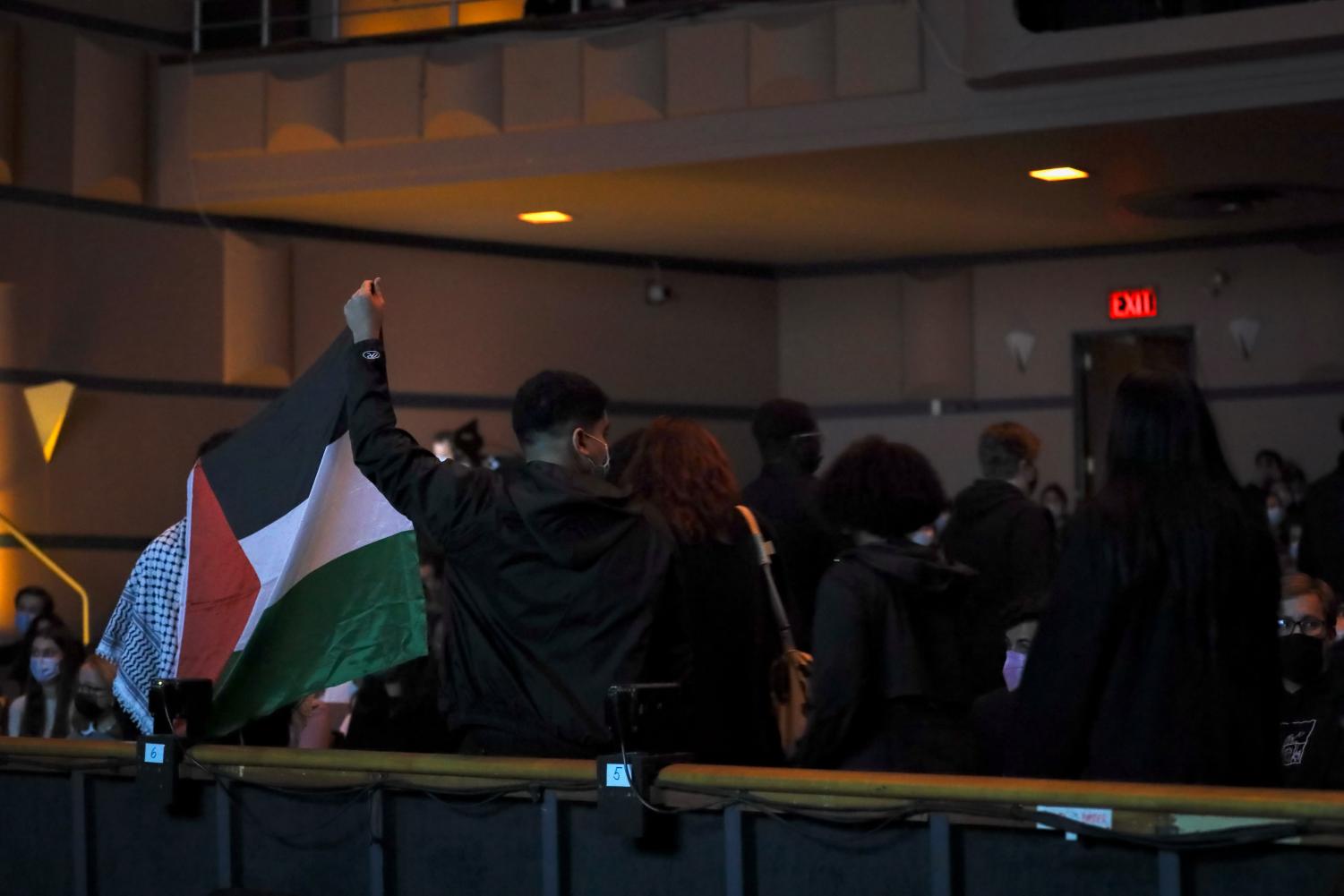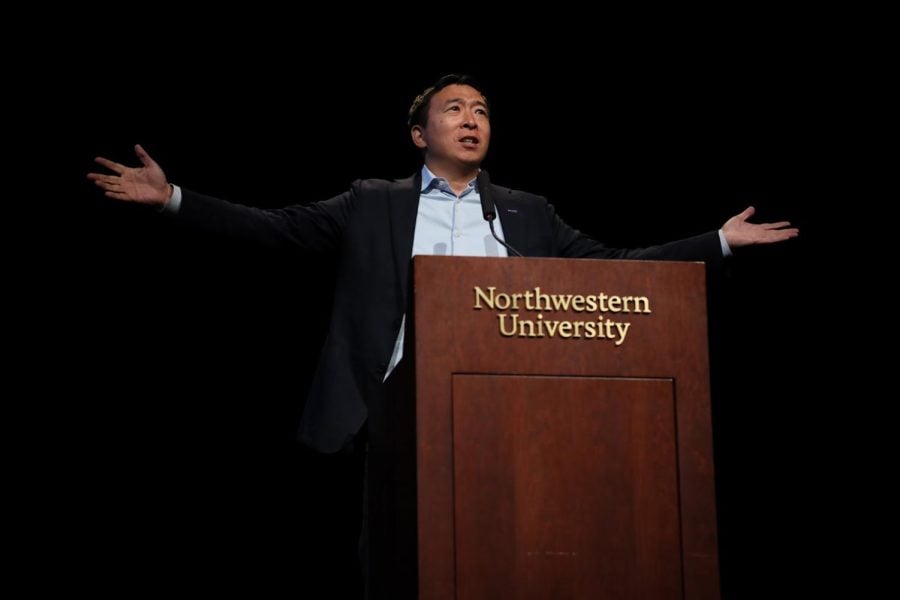Andrew Yang talks new party, universal basic income at NU College Democrats event; 60 students protest
Joanne Haner/The Daily Northwestern
Former 2020 presidential candidate and New York City mayoral candidate Andrew Yang spoke to students Tuesday. About 60 students staged a silent walkout at the event, led by Students for Justice in Palestine.
October 27, 2021
2020 presidential candidate and New York City mayoral candidate Andrew Yang spoke on universal basic income, his recently-launched Forward Party and his rise to national political fame at a Northwestern College Democrats event Tuesday.
About 60 students staged a silent walkout led by Students for Justice in Palestine, a student group that promotes self-determination for the Palestinian people, after Yang gave his introductory speech. Dressed in all black and holding Palestinian flags, the group filed from the auditorium to protest Yang’s stance on Israel and Palestine, as well as his viewpoint on policing.
SJP passed out flyers at the start of the event to audience members referencing a tweet Yang wrote in May 2020 standing with Israel after violence broke out in Sheikh Jarrah, which Yang later apologized for on Twitter. Yang did not acknowledge the walkout nor discuss the Israel-Palestine conflict at the event.
Yang answered questions throughout the rest of the evening posed by history Prof. Michael Allen for a sold-out audience in Cahn Auditorium, which seats 1,000. Having recently left the Democratic Party, Yang said he seeks to offer an alternative to the two-party system and work against polarization with his new Forward Party. He said third parties have been proven to work in other nations.
“Our system … is designed not to work,” Yang said. “The duopoly is growing more and more extreme because the incentives actually reward (politicians) for (not) being … the compromising, collaborative type, but the inflammatory … type.”
Ben Chasen, director of public relations for College Democrats, said the organization booked Yang before he left the Democratic Party. But Chasen, a Medill junior, still sees Yang as a champion of certain progressive policies.
Yang expressed pride in seeing universal basic income, a policy he said he has advocated for since 2013, enter the national political conversation. He added the government needs to replace existing welfare structures with his famous $1,000 per month financial cushion.
“If you look at the numbers, more and more Americans are getting pushed to the side, and the transitions that people imagine are happening according to classical economics are not happening in real life,” Yang said.
SJP’s co-president, who chose to remain anonymous, also criticized Yang’s support for increasing the number of New York Police Department officers during his run for NYC mayor. Yang was also endorsed by a police union. In their flyers, SJP students wrote Yang supported activities to suppress Black and Palestinian activists.
“You can’t be progressive while failing to acknowledge genocide and what’s one of the worst human rights violations in the past several decades,” Shaheen said.

Chasen said the College Democrats weren’t expecting student protest. However, as a forum that encourages political dialogue, he thanked protesters for making their perspectives known. He added the College Democrats have no official stance on specific political issues.
SESP junior Hayden Harb, who is Palestinian, said he isn’t a fan of Yang. But Harb didn’t think the walkout was an effective way of engaging with him.
“Asking questions and making him answer for whatever you think he needs to answer for is much more effective,” Harb said prior to the event.
During the professor’s Q&A, an audience member interrupted and asked why Yang supported Israel and the NYPD. Yang didn’t answer, saying he would be happy to speak with the person after the event.
Other audience members critiqued Yang’s perspective on Asian American issues. When asked about anti-Asian racism, Yang emphasized the need to acknowledge the struggles of both perpetrators and victims.
“Anti-Asian racism is very real, of course,” Yang said, “but I think that we can approach this just by helping people who are struggling, and if we do that, that’s going to help people who may be victims of violence, whether they’re Asian or any other background.”
An audience member said as an Asian American, she was disappointed by Yang’s response and felt like he was making excuses for perpetrators of violence. She then walked out of the auditorium.
Though some students echoed this sentiment, others appreciated the perspective of a politician from an underrepresented community.
Throughout the event, Yang made a point to connect with the struggles of young people through his own range of experiences in the political arena. Chirag Goel, a first-year in the Feinberg School of Medicine, said it was inspiring to see a person of color run for president. He said he appreciated Yang’s perspective as an outsider politician.
“It made it seem that a person from any background could run for this position,” Goel said.
This story has been updated to redact the name of a source out of concern for their safety.
Email: [email protected]
Email: [email protected]
Twitter: @hannah_feuer
Related Stories:
— Former presidential candidate Andrew Yang to speak on campus
— Northwestern alum challenges former DNC chair in Florida primary
— Amid an uncertain election cycle, organizers move campaigning online












